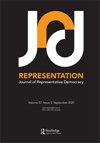Great for constitution writing but an obstacle to democratic consolidation: The ephemeral value of the Hare Quota formula in Tunisia’s parliamentary elections
Q2 Social Sciences
引用次数: 1
Abstract
The Hare Quota-Largest Remainders (HQLR) formula promoted consensus-building during Tunisia’s constitution-writing process and in the new democratic regime’s first years but it is now an obstacle to democratic consolidation. HQLR discourages the development of a tractable partisan choice set -- one large enough to afford voters meaningfully distinct options but not so large as to be cognitively overwhelming -- and fosters party fragmentation in parliament, obstructing the formation of workable governing coalitions. One result has been coalitions and national unity governments so heterogeneous as to lack common purpose, frustrating and disillusioning citizens and risking nostalgia for the decisiveness of the previous, authoritarian system. Replacing HQLR with either D’Hondt or St.Lague divisors formula would reverse the incentives toward parliamentary fragmentation, foster a more coherent political party landscape, and, if democratic competition is restored following President Kais Said’s auto coup in July 2021, facilitate Tunisia’s democratic consolidation by clarifying partisan accountability in parliament.突尼斯议会选举中“Hare配额”公式的短暂价值,对宪法的制定大有帮助,但对民主的巩固却是一个障碍
Hare配额-最大剩余(HQLR)公式在突尼斯的宪法起草过程和新民主政权的头几年促进了共识的建立,但现在它成了民主巩固的障碍。HQLR阻碍了一个易于处理的党派选择集的发展——一个足够大的选择集,可以为选民提供有意义的不同选择,但又不会大到在认知上压倒一切——并助长了议会中的政党分裂,阻碍了可行的执政联盟的形成。一个结果是,联合政府和民族团结政府如此多样化,以至于缺乏共同目标,让公民感到沮丧和失望,并有可能怀念以前专制体制的果断。用D 'Hondt或St.Lague除数公式取代HQLR将扭转议会分裂的动机,促进更连贯的政党格局,并且,如果在2021年7月Kais Said总统的汽车政变后恢复民主竞争,通过澄清议会中的党派责任,促进突尼斯的民主巩固。
本文章由计算机程序翻译,如有差异,请以英文原文为准。
求助全文
约1分钟内获得全文
求助全文
来源期刊

Representation
Social Sciences-Sociology and Political Science
CiteScore
3.50
自引率
0.00%
发文量
31
期刊介绍:
This change in scope follows two paths. Firstly, it seeks contributors who are interested in exploring the interface between democratic practice and theory. In particular, this focus seeks contributions that apply theoretical insights to actual examples of current practice. Secondly, while not neglecting the current focus of the journal, we would like to expand its international coverage so that the journal will offer our readers insights in the state of democracy worldwide.
 求助内容:
求助内容: 应助结果提醒方式:
应助结果提醒方式:


